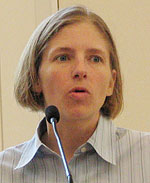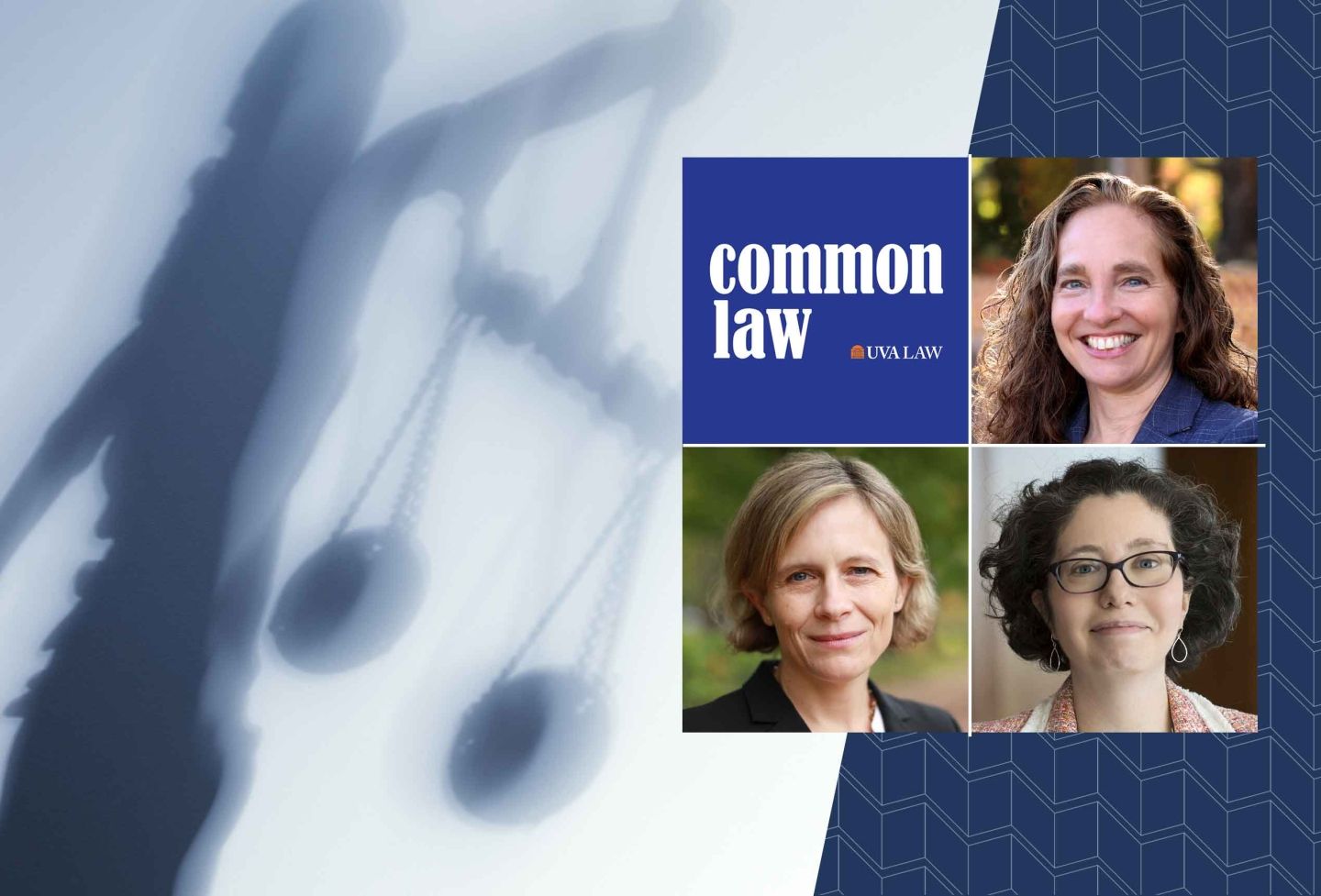Proposed Virginia Amendment May Strike Down More than Same-Sex Marriage, Panelists Say

The proposed Marshall-Newman Amendment to Virginia’s state constitution has powerful implications for families—but not in a positive way, panelists said at an event Sept. 18 that reviewed the law. The Marshall-Newman Amendment, on the ballot in the November election, will not only prevent the marriage of same-sex couples and access to the rights that come from it, it will affect the rights of married and unmarried couples in the Commonwealth as well, suggested the panel, which consisted of law professors Kerry Abrams, Michael Klarman, and Kim Forde-Mazrui, and Dyana Mason, field director of the Commonwealth Coalition and executive director of Equality Virginia. The event was sponsored by the ACLU Chapter at U.Va. Law, Virginia Law Democrats, and LAMBDA Law Alliance.
“The amendment should be opposed because it is wrong. Not because there is some general principle about not putting lots of things into constitutions but rather because the substance of the amendment is wrong,” Klarman said. “If somebody proposed an amendment saying white people can’t marry black people or Catholics can’t marry Jews it would be obvious to us that the amendment is wrong. This amendment is equally wrong and if you ask me how I know, I know it for the same reason I know the other things are wrong. It’s wrong to discriminate against people based on race. It’s wrong to discriminate based on religion. It’s wrong to discriminate based on sexual orientation.”
The language in the amendment is broad and could affect the ability of an unmarried person to leave property to a significant other or child, to designate a partner as a medical proxy, or even visit a loved one in the hospital, among other things, Abrams said.
“I think one of the reasons that this has caused such an uproar is that the [language] is so much broader than other same-sex marriage amendments,” Abrams said. “If this amendment passes, we will see courts invalidating things like domestic violence laws that apply to couples who aren’t married just as much as they apply to couples who are married.”
Opponents of same-sex marriage hold parallel beliefs to opponents of interracial marriage, Forde-Mazrui explained. Justifications that same sex-marriage is unnatural, goes against God’s will, or is a product of mental disease, and that children of same-sex parents may develop confusion about their own sexual orientation and must live with the stigma of having parents of the same sex are similar to arguments made when states were passing laws to ban interracial marriage. These reasons are unfounded and discriminatory, he said, just as they were for interracial marriage.
“In this case, in the Virginia case, they are not just banning marriage. This goes far beyond that and prohibits partnerships and possibly even individual powers of attorney, inheritance, [and] insurance, things of that sort—individual benefit agreements that go well beyond marriage.”
Historically, same-sex marriage in the United States has been a political divider, Klarman said, but public opinion is changing rapidly and the same-sex marriage platform is losing its steam in the Republican Party. In 1861 there was an effort to amend the U.S. Constitution to forbid Congress from interfering with slavery. At the time, public opinion was rapidly changing in favor of abolishing slavery. Similarly, the Marshall-Newman Amendment is an attempt to control the future, he said.
“I think it’s almost inevitable that [public opinion] will continue to change on this issue because of demographics. As you probably know, there is a very powerful age correlation. People who are below the age of 30 already favor same-sex marriage. I don’t have much doubt that in the next 20 years public opinion will continue to change and same-sex marriage will be seen by most people as unobjectionable and people will wonder what the fuss was about.”
Mason predicted that the amendment ultimately will not pass. In order to make changes to the Virginia constitution, the amendment must be passed through the legislature twice, separated by at least a General Assembly election, she explained. The amendment passed its first round in 2005 and is on the ballot again this fall.
In 2005, the House and the Senate passed different versions of the amendment, which then had to be reviewed in a conference committee. From that conference, five representatives produced the Marshall-Newman Amendment, which Mason called “the most broadly written anti-marriage amendment that we’ve seen so far in the country.”
Even the supporters of the bill worry that it may go too far, may cross lines, and may be unconstitutional on various grounds,” Mason said.
With an unpopular president in the White House and an unpopular Republican Party, Mason said there are many factors in favor of the amendment failing in Virginia. Same-sex marriage is not as divisive as it once was, and many voters who oppose same-sex marriage also oppose this amendment, she suggested. Polling has shown that Virginia voters are trending towards voting against the bill and the competitive Senate race seems to lean in the same direction. U.S. Sen. George Allen’s recent racial comments have depressed his constituency while his opponent, Jim Webb, has supporters that tend to be more invested in the same-sex marriage issue.
Founded in 1819, the University of Virginia School of Law is the second-oldest continuously operating law school in the nation. Consistently ranked among the top law schools, Virginia is a world-renowned training ground for distinguished lawyers and public servants, instilling in them a commitment to leadership, integrity and community service.


